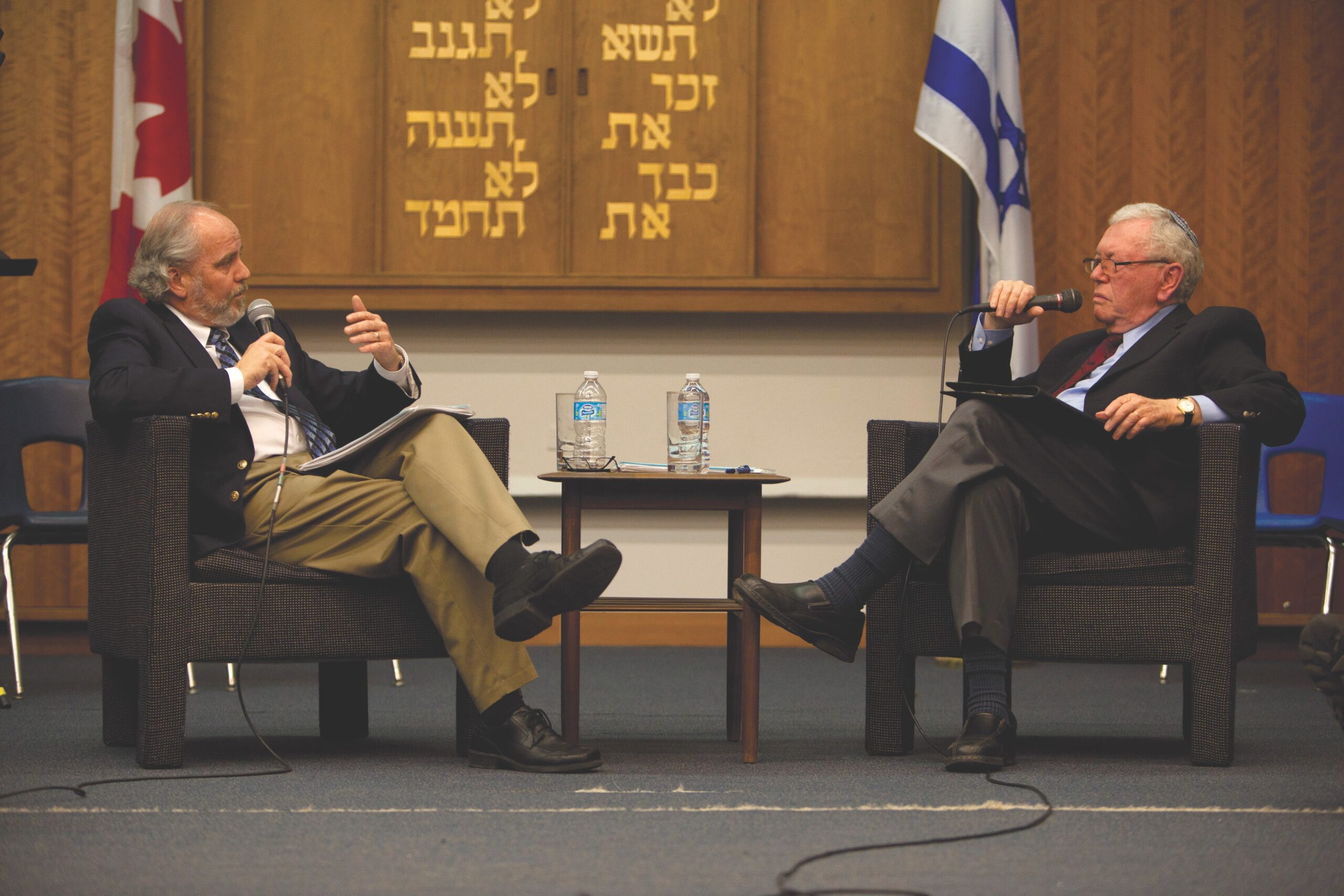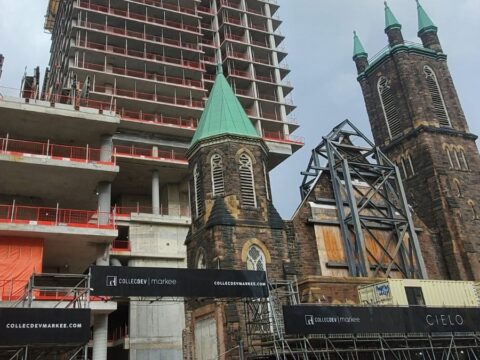The youth chapel on the third floor of Toronto’s Holy Blossom Temple could be a room in any number of churches across Canada: padded straight-back pews are arranged in a U-formation, while fabric banners and religious-themed prints hang on the walls.
But at the front of the room there’s a significant difference: next to the Canadian flag stands the flag of Israel. Beneath the two flags is a pair of easy chairs. On a Monday evening late last year, a senior official of The United Church of Canada is seated in one of them, doing his best to relax.
You may unsubscribe from any of our newsletters at any time.
Rev. Bruce Gregersen has been invited to Canada’s largest Reform synagogue — “the heart of liberal Zionism,” as he later describes it — to explain the church’s Israel and Palestine policies and to answer questions about the General Council’s decision last August to support a boycott of goods produced in Israeli settlements in the West Bank. Delegates voted in favour of the boycott despite opposition from one of the most intense lobbying campaigns the church has ever faced, largely led by the Centre for Israel and Jewish Affairs (CIJA). In the wake of the decision, CIJA called on the Canadian Jewish community to suspend relations with the United Church.
In front of an audience of about 200 people, Gregersen outlines the church’s longtime opposition to the Israeli occupation and tries to explain a policy that calls for a boycott limited to goods produced in illegal settlements, while supporting Israel’s continued existence as a Jewish state. Years of requests from the Palestinian Christian community led to the policy, which also reflects the United Church’s concern that expanded settlements threaten a two-state peace plan, he says.
“The settlements are being constructed, they are real, they are taking Palestinian land and they are making the peace settlement almost impossible,” Gregersen says.
It soon becomes clear that many in the audience also worry about the effects of settlements and occupation, but at the same time hold deep-seated suspicions of Palestinian motivations, as well as concerns that the United Church is laying too much blame for the perennial failure of Middle East peace efforts on Israel and Jews.
“There seems to be something in the United Church, as we Jews perceive it, that has it in for us Jews in the guise of being anti-Israel, or critical of Israel,” says Holy Blossom’s Rabbi Emeritus Dow Marmur. Some Jews may be critical of the settlements, but that’s a Jewish and Israeli “family” matter, says Marmur, and outsiders are not welcome to join in.
“I think the settlements are a very bad thing,” adds Marmur. “What I do think, however, is also bad, is this kind of selective criticism you experience.” Near the end of the event, when a temple member expresses her disappointment over Israeli plans for 3,000 new settlement housing units, announced a day earlier, the audience applauds.
Marmur says, “You see, there is a difference between an internal and an external criticism.” But when the woman asks what acceptable actions she can take against settlements, Marmur has no answer.
The simple fact of Gregersen’s presence at Holy Blossom may indicate an openness to discussions about Israel and Palestine that seemed unlikely immediately after General Council’s decision. At CIJA’s late September board meeting, says CEO Shimon Koffler Fogel, the group decided to “encourage and support dialogue at the local level,” especially where United Church people disagree with General Council’s decision, but to sever connections to the national United Church.
There’s only one such connection: the Canadian Christian-Jewish Consultation, where representatives of CIJA (replacing the now-defunct Canadian Jewish Congress) meet to talk with the Canadian Conference of Catholic Bishops and the Canadian Council of Churches. The United Church of Canada attends as a church council member.
CIJA informed the consultation it would not take part so long as the United Church was involved. The United Church then offered to withdraw, but the Christian members of the consultation do not want to continue without Canada’s largest Protestant denomination, and have asked for a meeting with CIJA. Fogel says he will meet with them but won’t back down on his stance against the United Church.
CIJA’s softer stand on contacts at the local level comes as good news for Westminster United Church and Temple Shalom synagogue in Waterloo, Ont. They have shared the Cedars Worship Centre for about 17 years. In the sunny sanctuary, the temple faces east and the church west. The Jewish and United Church groups built the centre together and still have a “warm and wonderful relationship,” says Rabbi Lori Cohen. Westminster did not actively lobby against the Palestine-Israel motion, but did suggest wording changes.
Cohen doesn’t deny coming under pressure from CIJA over her synagogue’s relationship with Westminster United, and she says her congregation was “disappointed” by General Council’s decision. “But that doesn’t mean we’re going to break off the relationship with our sister congregation. The idea of breaking off relationships at the community level does not make any sense at all.”
Rev. Mary Savage, minister at Westminster United, says some in her congregation might agree with General Council’s boycott decision, “but we would never say we’re going to do that, out of deference.”
The two congregations planned to meet last month for a joint discussion, taking a “text-based spiritual approach to what our respective religions teach us about Israel,” says Cohen. Both congregations hope forces outside their walls will not create tensions inside.
A new Reform Jewish congregation in downtown Toronto also came under pressure from CIJA for its United Church ties. The liberal City Shul congregation had agreed to rent space from Trinity-St. Paul’s United for High Holiday celebrations last September; after General Council approved the boycott, CIJA asked the congregation to make other arrangements. But the City Shul stuck with its plan, working with Trinity-St. Paul’s to schedule a closed-door dialogue session for members of both congregations to clear the air.
According to Rev. Hans van Nie, the Trinity-St. Paul’s minister who organized the dialogue with Rabbi Elyse Goldstein, “We felt that in spite of everything, it was a good thing to talk.” There were about 100 participants from the two congregations.
For her community, says Goldstein, “the boycott feels punitive and not positive.” Members of the Shul wanted to know why the United Church seems to be singling out Israel for criticism while not supporting it against clear enemies such as Iran. She says the session “might have been more helpful if people came with more open minds — especially from the church. Some of my members felt the church folks came to lecture us about how terrible Israel is and why we should be more critical. Not the minister, but the laypeople.”
For his part, van Nie says he came away with a greater understanding of a “gut feeling of vulnerability” among many Jews. The two communities are considering organizing another shared event.
For some United Church congregations, strained relations with CIJA have led to stronger ties to Independent Jewish Voices (IJV), a national organization that opposes Israel’s occupation of the West Bank and lobbied in favour of General Council’s decision last August.
When an Ottawa rabbi cancelled interfaith dialogue programs with Kanata United, Ottawa-based IJV official Diana Ralph stepped in to arrange presentations on Judaism and a visit to a local synagogue. Ralph also took part in a worship service at Ottawa’s Trinity United and met with the congregation’s community and society committee to help plan education programs and possible action.
Independent Jewish Voices is a small volunteer-run organization with chapters in eight Canadian cities. Some IJV members and pro-Palestinian activists in the United Church also work together in the newly formed United Network for a Just Peace in Palestine and Israel. It had hoped to launch a boycott campaign late last year, targeting two products of Israeli settlements, but decided to hold off and possibly co-ordinate with General Council efforts.
So far, those efforts have been largely educational. Gregersen has spoken about the General Council’s action at various church gatherings, but by year’s end the church hadn’t issued a list of settlement products to avoid. The church was planning to ask the Canadian government to require companies to label goods produced in settlements located beyond Israel’s pre-1967 borders — something that’s already required in Denmark and South Africa, and is being promoted across the European Union by a group of 22 churches and church agencies.
Consultant Dale Hildebrand, a Middle East specialist and former staff member at the interchurch coalition KAIROS, is working part time for General Council, marshalling congregational resources, planning boycott strategies and organizing “a kind of speakers’ bureau,” including about 15 United Church people who have served in the Ecumenical Accompaniment Programme in Palestine and Israel.
Explaining the General Council action to the United Church membership is proving to be a challenge in itself. Rev. Thom Davies, a retired minister in Hamilton who spent three months in a West Bank Palestinian community last year and served on the working group that drafted the report calling for the boycott, has spoken to several congregations. Some members mistakenly think the church adopted a full-blown boycott of Israel and that the decision was engineered by General Council staff, he says. They’re “far more comfortable when they realize it is just settlement products” that will be boycotted, “not all of Israel,” Davies adds.
Another message the United Church wants to get across is that the General Council did not make its decision in a vacuum. The United Methodist Church in the States, Presbyterian Church (U.S.A.) and British Methodist Church have all adopted boycotts of settlement products. Recently, 15 mainline churches and faith-based groups in the United States wrote a letter to the U.S. Congress, questioning American military aid to Israel and asking it to look into possible violations of U.S. laws.
Some in the United Church, though, remain unmoved by these developments. Late last year, United Against Boycott — a loosely organized group of 13 Ontario and British Columbia ministers, brought together by Rev. Greg Smith-Young of the Elora-Bethany (Ont.) Pastoral Charge — was drumming up online support for a challenge to General Council’s decision. The Board of Westminster United in Winnipeg has also publicly opposed the boycott.
At the Holy Blossom Temple event, no one states outright support for Israeli settlements, but a number say Israel would readily abandon many of them in favour of a durable peace agreement. Some observe how Israel’s withdrawal from occupied land in Lebanon and Gaza simply opened up Israelis to rocket attacks from closer range.
As the evening ends, Gregersen repeats an invitation and challenge that Palestinian Christians have asked the United Church to share: come and see for yourselves.
“Part of the problem we have in this is that very few Jewish colleagues have the opportunity to visit and speak to Palestinian people in the occupied territories,” he says. “I know there are Jews who journey into the West Bank. I don’t think there are enough. I would hope that shared journeys would be possible. I would encourage you to talk to Palestinian Christians about the reality of what they face. We do that all the time, and that is part of what has motivated the policies we have.”
***
This story first appeared in The United Church Observer’s February 2013 issue with the title “After the boycott.”














